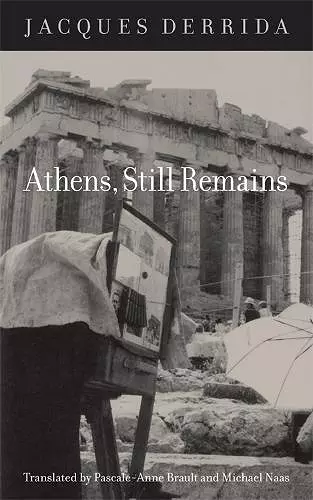Athens, Still Remains
The Photographs of Jean-François Bonhomme
Jacques Derrida author Michael Naas translator Pascale-Anne Brault translator
Format:Hardback
Publisher:Fordham University Press
Published:13th Oct '10
Currently unavailable, and unfortunately no date known when it will be back
This hardback is available in another edition too:
- Paperback£21.99(9780823232062)

Athens, Still Remains is an extended commentary on a series of photographs of contemporary Athens by the French photographer Jean-François Bonhomme. But in Derrida’s hands commentary always has a way of unfolding or, better, developing in several unexpected and mutually illuminating directions.
First published in French and Greek in 1996, Athens, Still Remains is Derrida’s most sustained analysis of the photographic medium in relationship to the history of philosophy and his most personal reflection on that medium. At once photographic analysis, philosophical essay, and autobiographical narrative, Athens, Still Remains presents an original theory of photography and throws a fascinating light on Derrida’s life and work.
The book begins with a sort of verbal snapshot or aphorism that haunts the entire book: “we owe ourselves to death.” Reading this phrase through Bonhomme’s photographs of both the ruins of ancient Athens and contemporary scenes of a still-living Athens that is also on its way to ruin and death, Derrida interrogates a philosophical tradition that runs from Socrates to Heidegger in which the human—and especially the philosopher—is thought to owe himself to death, to a certain thought of death or comportment with regard to death.
Combining philosophical speculations on mourning and death, event and repetition, and time and difference with incisive commentary on Bonhomme’s photographs and a narrative of Derrida’s 1995 trip to Greece, Athens, Still Remains is one of Derrida’s most accessible, personal, and moving works without being, for all that, any less philosophical. As Derrida reminds us, the word photography—an eminently Greek word—means “the writing of light,” and it brings together today into a single frame contemporary questions about the work of art in the age of mechanical reproduction and much older questions about the relationship between light, revelation, and truth—in other words, an entire philosophical tradition that first came to light in the shadow of the Acropolis.
"Taking his point of departure from Bonhomme's wonderful photographs of Athens'photographs that bear the traces of the history of this living and dying city, as well as of an entire network of questions that have remained at the heart of the history of philosophy ever since its earliest Greek beginnings'Derrida offers us a moving meditation on the relations among photography, light, writing, memory, mourning, death, and survival. Presented as a series of photographic stills-in-prose, his exquisite essay not only enacts and performs what it wishes to convey, but it also tells us that we did not have to wait for the invention of photography to learn why ^3we owe ourselves to death,^2 or why, at every step of this wondrous photographic and philosophical journey, we also ^3owe ourselves to life.^2 It demonstrates once again why, like Athens, Derrida still remains one of our most cherished resources." -- -Eduardo Cadava Princeton University "In this fascinating short book Jacques Derrida ruminates on the photographical instant in the work of Jean-Francois Bonhomme. Confessing his 'passion for the delay' Derrida reads photography as an experience of mourning made possible by the full daylight of Athens and its surroundings. The book presents Derrida at his best, as he travels to ancient sites, contemplates the city and technics, reads ships and Plato - ultimately writing a picture, if that is possible, of photography itself." -- -Sander van Maas Utrecht University and University of Amsterdam "Athens, Still Remains-from the outset, a remarkable translation of an untranslatable title-is not only Jacques Derrida's most luminous and in-depth essay on photography: it develops itself as a photograph, bringing into new light the most structural aspects of the medium as well as its most fragile and fleeting ones. Struck by an enigmatic phrase-"We owe ourselves to death"-that takes a shot at him from the very beginning of his journey through Greece and will taunt him throughout, Derrida's reflection is irresistibly drawn to the photographic image by its spectral monumentality, the memory in the figure of the ruin it displays, the defer/delay (another name for Derrida's differance) effect at work in each image, bearing death from within. The departed, the multiple folds in which the departing process is present in the image, mourning and its intricate workings: this is what catches, here as always, Derrida's philosophical (and "autobiographical") attention-his meditation, rather, impregnated with melancholy, but always of the most active, creative, lively kind. But Athens, Still Remains is not only an essay on photography: more audaciously, Derrida suggests that it is philosophy itself that owes something, in its very "essence" or "origin", to the photographic image. A perfect example of the art of contretemps it analyzes so astutely, this moving essay-magnificently rendered if not heightened by Brault and Naas's most careful translation-comes to us at just the right moment: just in time. For there is no too-late in the reading of Derrida's work: it is there, ahead, waiting for us still." -- -Ginette Michaud Universite de Montreal
ISBN: 9780823232055
Dimensions: unknown
Weight: unknown
88 pages